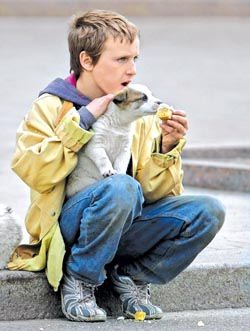Living on the street means violence
National Academy’s Institute for Social Studies investigates homeless children
Juvenile crime, child pornography, pedophilia are nothing new for Ukraine. The Artek case only served to boost public interest in the subject. A mere 35 criminal cases involving sexual harassment and related crimes have been opened. UNICEF Ukraine commissioned the National Academy’s Institute for Social Studies to investigate this sphere. Over 10 percent juvenile respondents admitted to having been exposed to sexual harassment; five percent said they had or were still prostituting themselves to earn a living. A total of 1,000 minors — children of the street, including those with or without parents, children from problem families, orphans, and those denied parental care — were interviewed. The investigation involved 58 experts, in-depth interviews with 40 parents whose children had experienced sexual harassment.
Says Lidia Amdzhadin, Ph.D. (Sociology), investigative project coordinator: “The reason children prefer to keep facts of sexual harassment to themselves is their lack of confidence in the milieu, authorities, feeling of shame, failing to comprehend such facts, also the banal unwillingness to expose their parents as perpetrators, love for their parents, and the fear of institutionalization in case of termination of parental rights. The number of homeless children has lowered considerably in Ukraine because the government has started paying more attention to this problem. Finding and interviewing such children was difficult. In most cases they shied away from discussing such subjects with experts, and the older (starting at 13) the shier. The same was true of children who lived with their parents. Younger children are more inclined to tell their parents about facts of sexual harassment, whereas older children tend to share such secrets with their friends.”
Olha Shved, ECPAT International’s CIS representative, informed about similar studies carried out in Ukraine previously (in 1997, to be precise). She stressed the media’s important role in shedding light on child sexual harassment, the legal punishment (Articles 155 and 156 of the Criminal Code of Ukraine, envisaging 5-8 years of imprisonment, along with a ban on the occupying of posts involving work with children). The law also provides for legal responsibility for the trafficking of children, exploitation of child labor, and using children as beggars (Articles 149-150/1 CCU). Persons found guilty as charged under these clauses receive at least three years; in case of the trafficking of babies this term can be extended to 15 years.
“Despite the popularity of professional psychology in Ukraine, there aren’t enough experts on the rehabilitation of children who have suffered sexual harassment. In addition, there isn’t a system of timely medical response on the part of polyclinics and hospitals to body injuries — bruises, discolorations — resulting from physical assaults, as well as to children’s complaints of having suffered acts of violence,” emphasizes Olha Shved.
Dr. Vasyl Kyslytsky, Ph.D. (Law), points to a number of important documents studied in the course of investigation: “Sociologists believe that child sexual harassment tends to increase within the family, with such acts perpetrated by parents, guardians, and relatives. This is a very dangerous trend, but at the same time it is a separate phenomenon and it is necessary to discuss the reasons behind it on a larger scope. Perhaps the point is the specifics of the information space in Ukraine, the lack of the necessary useful information. In other civilized countries the official information policy is considerably harsher — with regard to the advertising of prostitution and juvenile violence, things that have such a strong effect on the children’s audience. Americans say that the media are responsible for eight percent of the crimes committed in their country. What about the responsibility of the Ukrainian media?”
The findings of this investigation apparently must not be analyzed only in narrow professional circles. They must be heard in parliament, by its special committees, and publicly discussed.






